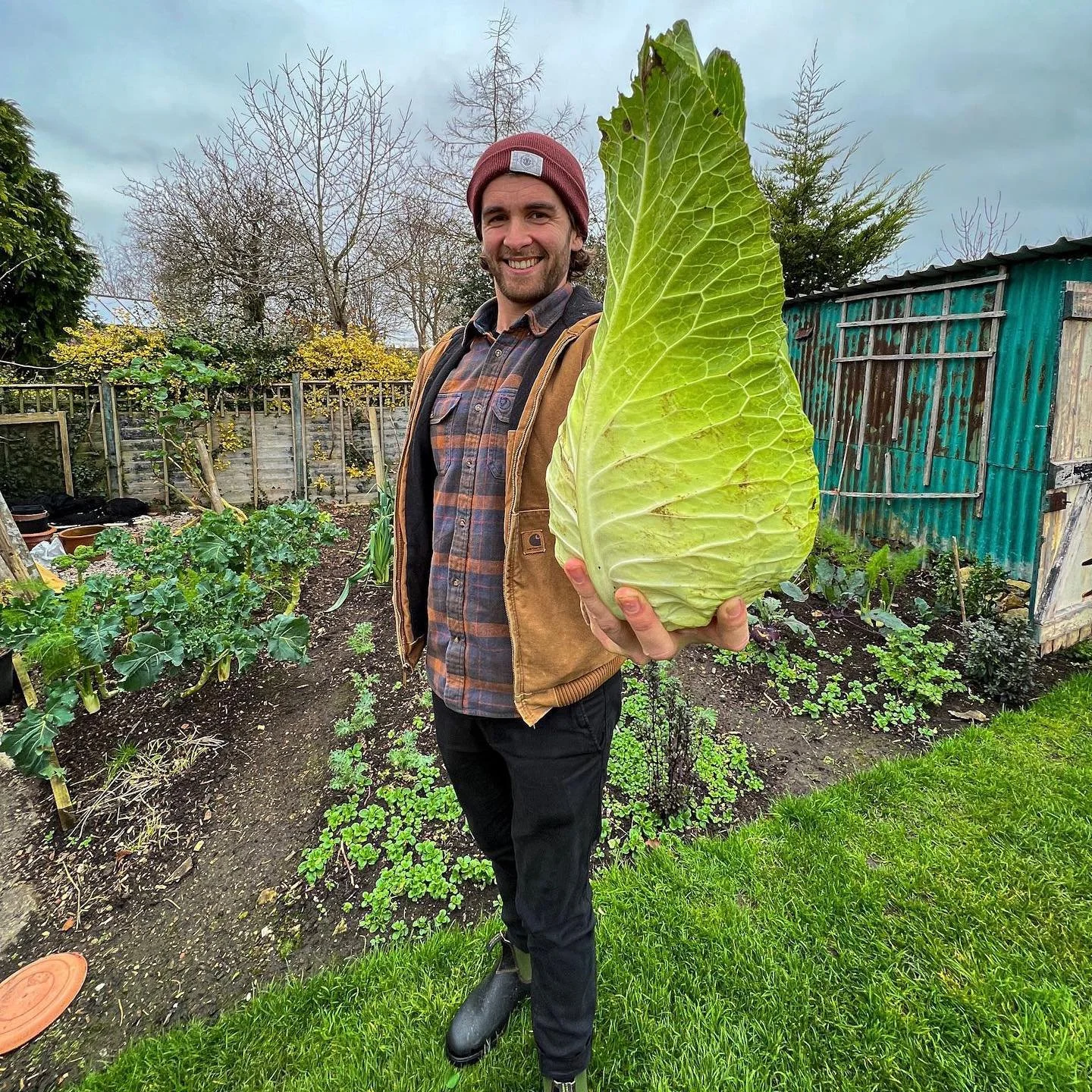‘Getting your power back’: an interview with Jack’s Patch
Jack Hodgson is an urban farmer and educator who is helping the Surge Sanctuary get involved with organic plant-based farming. In this interview, he takes us through his past and future projects with Surge and explains the power of growing your own food.
Jack’s Patch is an organic veggie market garden in Essex where produce is grown under the principles of permaculture, a regenerative approach to farming based on understanding nature and working with ecosystems, rather than trying to control them.
Some of the ways in which Jack’s Patch employs these principles is a ‘no-dig’ policy, whereby instead of digging down to remove weeds - which is harmful to the soil and all of the microorganisms living in it - organic matter like garden compost is applied, replicating the natural process of decomposition. In Jack’s words, he also uses permaculture to “understand where the sun spots are, where the wind direction comes from and the ideal areas to add wildflowers so bees have to fly over the plot to pollinate vegetable flowers on their way.”
Last year, Jack set up a shipping container at the Surge sanctuary which functions as an efficient indoor mushroom farm. These oyster and lion’s mane mushrooms are used to make the delicious vegan meals on offer at Unity Diner, the proceeds of which help to keep the sanctuary running. This is the roundabout, community-centred ethos characterising permaculture.
“The mushrooms are a nice way people can connect with the sanctuary without actually going there,” Jack said. He is passionate about ‘exotic mushrooms’ - they are extremely versatile and oyster mushrooms for example can contain up to twice as much iron as button mushrooms.
He also explained how they can replace the demand for meat: “They are an amazing meat substitute… you can make them taste of anything if you flavour it right. Lion’s mane mushrooms can even have the taste and texture of crab and lobster.”
But Jack was also quick to stress that these kinds of mushrooms aren’t all that exotic. Indeed, many can be grown easily in UK homes: “You don’t need a garden or a balcony or to go down a rabbit hole on YouTube. Start small.”
Mushrooms, sprouts, microgreens and herbs are all good ideas for apartments. Check out Jack’s life hack showing how to grow microgreens in an oat milk carton.
Jack became vegan around six years ago and said his cooking skills and awareness about food and nutrition skyrocketed as a result. Around the same time, he ended up working on a permaculture farm while living in Australia, and this combined influence is how he ended up where is today: “By chance, I fell into this permaculture farm… it was a homestead that was leveraging nature’s natural systems to grow food and build good quality soil. Everything about it was just cool - it’s not sustainable, it's regenerative. So that place is always going to be better than when they found it.
“When I came home, all my mates thought I had turned into a hippie because I bought an allotment at 25. And now I’ve let that grow seriously, it’s my job and I’ve got a full market garden.”
One eureka moment for Jack was tasting the farm’s produce and realising how much more delicious it was compared to fruit and veg from the supermarket: “I was like, is this what a tomato is supposed to taste like?”
And when asked about the relatively higher price of permaculture produce, he stressed that the food tends to be far more nutrient-dense, thus “If you eat more nutritious food, you eat less, it fills you quicker.”
Aside from running a successful business that offers mouth-watering seasonal veg-box subscriptions, Jack’s mission is to empower others by sharing the knowledge he has accumulated. He regularly posts information, tips and tricks about permaculture on his Instagram stories.
One issue he identified is a lack of education in relation to growing food, making people think they have to buy all their food from the supermarket. This exacerbates the sort of apathy that leads people to continue consuming animal products. Therefore, educating yourself about the basics of growing food is a step towards regaining the autonomy that the meat, dairy and egg industry has sought to remove.
“With the way the world is going at the minute, it's one of these things everyone needs to know, how to grow even just five per cent more than they know now.”
Jack even highlighted how this can strengthen support for veganism by showing its principles in practice. Instead of using harmful pesticides like traditional farming, Jack uses a method called companion planting which involves strategically planting specific crops next to each other for their mutual benefit: “For example, if you grow basil next to a tomato, the basil lets off a pheromone that deters a fly which attacks tomatoes.” This pesticide alternative has the potential to stop millions of creatures from being killed and prevent poisonous substances from leaking into our water.
Jack added: “It’s just getting your power back a little bit and making the vegan argument even stronger. If you can say you grow your own food, even just a little bit, you’re bringing that power back to you - closing the loop a little bit more.”
In the future, subject to planning permission, Jack intends to help design an edible food forest in the Surge sanctuary, where food can be foraged from treetop to floor. This would involve planting tall fruit trees and perennial veg like garlic and asparagus - which grow for years from one sow - and laying mushroom spores in the soil.
Jack explained: “After a few years it will be a self-reliant system, with an abundance of food… it won’t need to be watered. It’s a hands-off approach, so it’s not like a veg farm that needs a lot of work. It’s planted once and gets better and better.
“I’m hoping a lot of goodwill comes out of my work with Surge… as well as saving animals we can grow our own food - this is the way we should be living.”
Follow Jack on Instagram to support his work and learn more about how you can get involved in permaculture.
Devon Docherty is a Surge Media intern and masters student in Human-Animal Interactions, working towards improving the lives of animals and humanity’s connection to them. Interested in psychology, rewilding and increasing the animal rights perspective in academia. Find Devon on LinkedIn.



